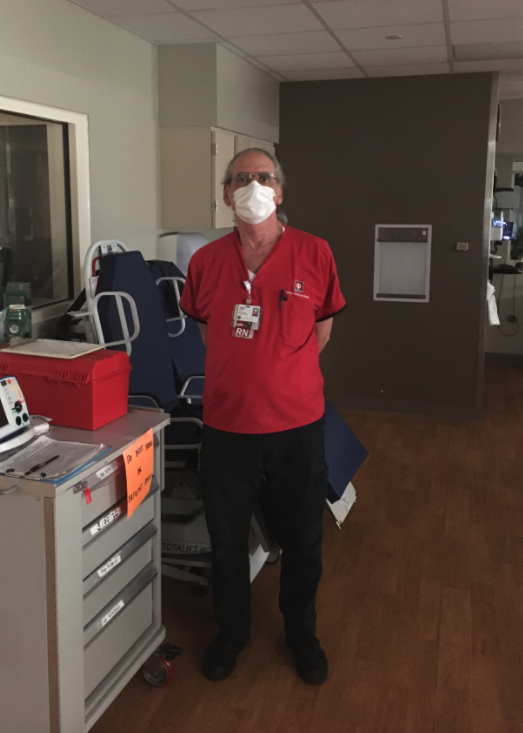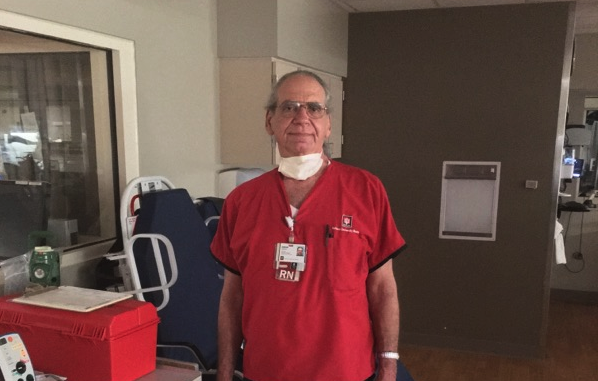Broad Ripple Resident Talks Life as an ICU Nurse During the Coronavirus Pandemic
Photography Provided
The impact of the novel coronavirus has been felt across the country, and health care workers are at the heart of combating this global pandemic. Indianapolis is no exception to the virus. Broad Ripple resident Adrian van Osch is just one of the intensive care unit (ICU) staff nurses at IU Health Methodist Hospital in downtown Indianapolis who has felt the impact.
He has worked at the hospital as a nurse for 36 years, and despite the gloom in much of the news coverage of the virus and its effects on the country and world, van Osch says the team at Methodist remains in relatively high spirits.
“I’d say we’re doing pretty good,” van Osch says. “We’re all banding together. We’ve worked through things before. Maybe not something like this, but every night is a different scenario in the ICU.”
Methodist leaders have made daily and weekly preparations as the COVID-19 outbreak has continued to result in an increasing number of patients. The hospital has ensured that nurses and other health care professionals are wearing masks and other personal protective equipment, and van Osch says the hospital has increased janitorial services. He also says nurses and other personnel are taking more extensive cleaning and sanitation measures than is typical for Methodist.

“When they clean a room, they’ve stepped up cleaning,” he says. “As nurses, we’ve got towelettes everywhere. The first thing we do on a shift change or when we enter a new room is clean the phones, clean the terminals, clean any flat surface, and any other equipment. So we’ve stepped up our game.”
He also says the hospital has moved older nurses and other high-risk personnel to areas of the hospital that are less likely to be exposed to the virus.
“They’re taking care of the nurses that way,” van Osch says. “Staff members who are over 65 or pregnant, for example, won’t go in the rooms with active COVID-19 cases. We’re taking care of the patients that we’d normally be taking care of anyway, but they’ll keep us away from the patients with the virus. If things get bad enough, that might change.”
While these measures will likely help, van Osch says the possibility remains that staff members could take the virus home with them. Despite this, he says most staff members don’t seem to be worried about getting the virus themselves.
“I think people are more worried about taking it home to their families than themselves,” he says.
Van Osch and his wife decided it would be best for her to stay in Muncie while the outbreak worsens. He, like many other people on the hospital’s staff, is worried about potentially taking it home and infecting her.
“In case I do get sick, she’s away,” he says. “So I’ve been doing the bachelor thing for the last couple of weeks. If I bring it home, I really don’t want to give it to her.”
The state of Indiana has seen thousands of cases and hundreds of deaths so far, and numbers change daily. Governor Eric Holcomb issued a stay-at-home order on April 6, designed to limit interactions among Hoosiers in an effort to contain the spread of the virus.
These measures are expected to help slow the spread of the infection so hospitals can keep up with the influx of COVID-19 cases. Governor Holcomb commended Hoosiers for doing a good job obeying the measures in a recent statement.
“I am asking you to take even more precautions – only make in-person purchases when absolutely needed, and use other delivery and pickup options when available,” Holcomb said in the statement. “Limit who is traveling with you and entering stores.”
Van Osch’s message to the community is similar. He urges people to follow guidelines, avoid big groups and crowded areas, and consider wearing masks and gloves if available. He also says people should act sensibly but not expect the situation last forever.
“It’s going to end,” he says. “It’s unfortunate, and it’s unfortunate that people are getting as sick as they are, but it will end, and we’ll get through it.”
If you have symptoms such as fever, persistent coughing or severe shortness of breath, contact your health care provider as soon as possible.






